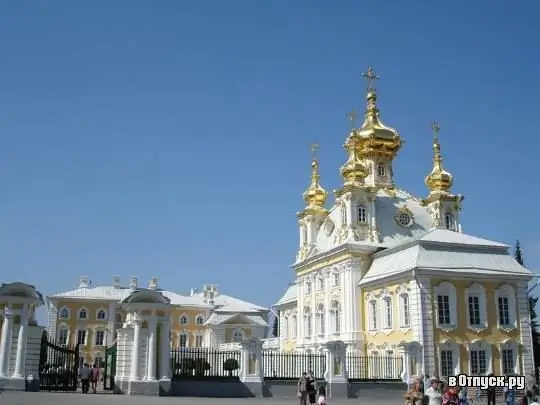
Description of the attraction
On July 12, 2011, the opening ceremony of the new Church Building Museum took place, which became the final stage in the long-term restoration of the Great Peterhof Palace in the post-war period.
The date for the opening of the museum was not chosen by chance. It is on July 12 that the Orthodox Church commemorates the Holy Primate Apostles Peter and Paul, in whose name the temple was named. In addition, this day was celebrated in Russia as the namesake (name day) of Emperor Peter the Great.
The interior of the church was designed by the architect Francesco Bartolomeo Rastrelli. The wall carvings and the iconostasis were made of linden by a team of Russian carvers led by Joseph Stahlmeer and Louis Roland. The carvings were covered with gold leaf. This work was carried out by St. Petersburg craftsmen headed by the goldsmith Jean-Baptiste Leprinse. The icons of the iconostasis, wall and dome paintings were made in oil paints on canvas by a group of Russian artists under the direction of Ivan Vishnyakov. Contemporaries admired the splendor of the interior of the temple, the abundance of paintings and gilded carvings. Twisted columns, the monogram of Empress Elizabeth Petrovna and the imperial crown were the decoration of the 6-tiered iconostasis. On the ceiling, walls and in the dome were picturesque paintings with religious themes. There are 51 canvases in total. This number recalls the year of the consecration of the church - 1751. In the dome you can see the image of the Holy Spirit in the guise of a soaring dove.
The church of the summer residence of the Russian rulers witnessed many unforgettable events of the Imperial House of Romanov. Its rich history reflects the variety of events in the summer life of the magnificent and incomparable Peterhof. Here they got married, baptized children, held magnificent services on the occasion of the most important religious and state holidays.
Until the beginning of the Great Patriotic War, the external appearance and interior decoration of the palace church remained unchanged. During the German occupation, the Church building was destroyed, the iconostasis, wooden carvings were irretrievably lost in the fire, icons, rare paintings and church utensils were lost.
In the 1950s, the facades of the temple were recreated according to the original design of Rastrelli with a single-domed dome. In 2003, the historic five-domed head was recreated. The final chord of restoration work began in 2008.
2011 was a jubilee year for the Church building: 260 years ago, the construction of the temple was completed and its solemn consecration took place, which was attended by Empress Elizabeth Petrovna. Since mid-July 2011, the Church Building Museum has been open to visitors.






